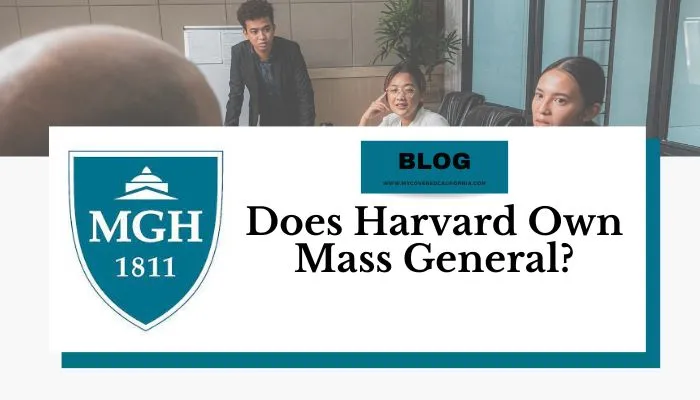Does Harvard Own Mass General? Harvard University and Massachusetts General Hospital (Mass General) are giants in their respective sectors: higher education and healthcare.
Both institutions have a long history that is recognized throughout the globe, so one naturally questions how the two powerhouses are connected.
This article examines the complex bonds between Harvard and Mass General that include their interwoven histories, formal links and ongoing research collaborations which drive forward-looking discoveries as well as great patient care.

Does Harvard Own Mass General?
Interestingly enough, there is significant overlap between these timelines.
A case in point is that during its foundation era Mass General witnessed enormous advances in medical science at the time when Harvard increasingly viewed hospitals as important training grounds for future doctors. Let’s see Does Harvard Own Mass General?
| Harvard University | Massachusetts General Hospital |
|---|---|
| Established in 1636 | Founded in 1811 |
| America’s oldest institution of higher learning | Third-oldest general hospital in America |
| Initially focused on theological studies | Originally intended to cater for the sickly and underprivileged people |
| Has grown into a large academic center encompassing various fields such as medicine, law, business, among others | Gained prominence owing to pioneering approaches and commitment to medical education |
| Notably produced prominent individuals ranging from Nobel laureates to presidents to scientists | – |
Symbiotic Relationship
The connection linking Harvard with Mass General go beyond just proximity. Let us delve deeper into this:
- As far as Harvard Medical School is concerned, Mass General lays claim to being its premier teaching hospital ever since it was established.
- This title speaks volumes about deep intertwining where HU students acquire priceless clinical skills from top notch physicians who work at MGH and many of whom also happen to be members of HMS faculty.
- Harvard Medical School and Mass General often overlap. Numerous doctors play dual roles acting as researchers and teachers in the university while offering excellent healthcare services to patients within these hospitals.
- So, knowledge flows freely in both directions keeping medical education always at the front of clinical practices. This dynamic research environment can be attributed to the synergies existing between these two bodies.
- For instance, through their joint ventures they have confronted some of medicine’s most intractable challenges e.g., developing novel therapies for cancer or uncovering the hidden truths behind neurological ailments.
With MGH’s world-class research institute and Harvard’s rich academic resources, this becomes an ideal hub for scientific breakthroughs.
Beyond Affiliations: A Culture of Collaboration
This is a relationship that goes beyond official frameworks connecting Harvard with Mass General. The following are examples of how their cooperation is manifested:
Joint Academic Programs
Interdisciplinary programs that draw on strengths from each entity exist so as to benefit students. Think of a student pursuing medicine who decides to participate in a research initiative at MGH guided by a full-time practicing physician who also lectures at HMS.
Thus, through such initiatives theory and practice are brought together thus producing balanced medical professionals.
Knowledge Exchange
Regular seminars, conferences, guest lectures enable faculty and students from both institutions to share ideas together.
It would not be uncommon for lecturers from HU making presentations about current investigations to MGH specialists hence leading up to new clinical applications being conceived out of them.
Daring to Innovate: The Shared Quest for Progress
This invokes a culture of progressive thinking that is characterized by constant exploration and refinement of new technologies as well as treatment methods. In turn, this has driven technological development that betters patient outcomes and stretches the limits of medical knowledge.
| The relationship between Harvard University and Massachusetts General Hospital is more than mere affiliation; it is a reminder about the importance of teamwork in achieving healthcare goals. |
It won’t be surprising if these resources keep on producing amazing discoveries as they progress, an investment in future generations of healers and learners.
Who Owns What?
Physical assets like buildings plus equipment belong to their respective institutions while intellectual property resulting from collective research often requires more nuanced approaches.
Their patenting or discovery rights depend on agreements between Harvard & MGH hence such assignments can benefit either of them. By doing this, all the institutions acquire some intellectual works.
| The Financial Lifeline Harvard University’s financial base varies from government grants to private donations, and endowments among others. Equally, while financially established MGH depends on various streams including patient care revenue, research grants & philanthropy. Even if there is no direct money flow from Harvard to MGH in terms of resource mobility faculty share ideas & collaborate on grant proposals which will increase their funding for collective research. |
Striking a Balance
Despite the close relationship, Mass General still retains significant financial autonomy as it sets its budget & makes independent financial decisions.
Nonetheless, being associated with Harvard provides Mass General high level recognition and enables the hospital to attract top medical professionals who might have an influence on grant opportunities in future.
| A Two-Way Street Furthermore, beyond just monetary issues Harvard has had a lot more effect on Mass General. There is heavy participation by Harvard Medical School faculty within key clinical practices at Mass Gen steering it towards remaining at the forefront of medical advancements. Conversely, cutting edge clinical experiences in MGH provide real world data that accelerate bringing scientific discoveries into tangible benefits for patients at Harvard Medical School. |
A Look Ahead: The Enduring Partnership
This is a relationship between Harvard University and Mass General which exemplifies collaboration at its best. It is an intricate partnership based on common values and commitment to excellence that has made them global leaders in health care and medical research.
As healthcare continues to change rapidly around them, their long-lasting partnership guarantees more breakthroughs that will shape medicine’s future.
| Stakeholder | Perspective |
|---|---|
| Harvard Faculty | Some might consider Mass General to be the foremost training ground for emergent research while others would like their clinical practices stronger aligned with academic rigor in this institute. |
| Mass General Staff | While nurses could demand that priority areas of research reflect patients’ immediate needs, physicians may welcome brilliant minds from Harvard. |
| External Experts | Scholars might underscore the need for academic freedom balanced with both Harvard’s influence and Mass General’s autonomy. |
| Healthcare Administration | What are the implications of coming together financially? These questions can only be answered if these experts look into how these two organizations benefit from resource sharing and collaborative grant proposals. |
| Public Perception | News outlets could focus on Harvard instead of appreciating what MGH achieves individually. The public might think that patients at Mass General are subjects for experiments rather than getting high-quality clinical care offered to them. |
This framework can serve as an example for other future collaborations between academic medical centers and health systems that will speed up progress on the medical landscape.
Conclusion
The question “Does Harvard Own Mass General?” seems simple but it is not so clear once you start thinking about it. A remarkable association between Harvard University and Massachusetts General Hospital has been formed over time which has driven medical advances as no other.
However, ownership is not everything; instead, there’s a two-way flow of knowledge, expertise, and resources.
In doing so, they will be able to take into account different viewpoints while at the same time encouraging open dialogue for continued success of this venture in healthcare throughout many generations ahead.
Remember: This complex relationship is constantly evolving. As new research endeavors and healthcare models emerge, the dynamic between these two institutions will undoubtedly adapt.

Hello, I’m Curtis Wallace, your go-to support for MGH Patient Gateway. With a commitment to streamlined healthcare processes, I’m here to guide you through your patient portal journey.